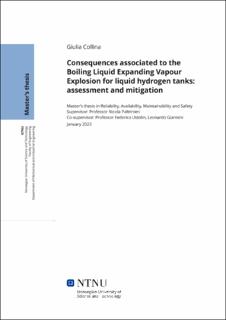| dc.description.abstract | Nowadays the urgency to address climate change and global warming is growing rapidly:
the industry and the energy sector must be decarbonized. Hydrogen can play a key
role in the energy transition: it is expected to progressively replace fossil fuels, penetrating
economies and gaining interest from the public. However, this new possible
energy scenario requires further investigation on safety aspects, which currently represent
a challenge. The present study aims at making a little contribution to this field.
The focus is on the analysis and modeling of hazardous scenarios concerning liquid
hydrogen. The investigation of BLEVEs (Boiling Liquid Expanding Vapor Explosion)
consequences lies at the core of this research: among various consequences (overpressure,
radiation), the interest is on the generation and projection of fragments. The
goal is to investigate whether the models developed for conventional fuels and tanks
give good predictions also when handling hydrogen.
The experimental data from the SH2IFT - Safe Hydrogen Fuel Handling and Use for
Efficient Implementation project are used to validate those models. This project’s
objective was to increase competence within safety of hydrogen technology, especially
focusing on consequences of handling large amounts of this substance. | |
